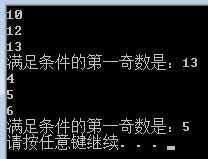标签:
也许你注意到了,我在前面的例子中已经用到了非成员begin()和end()函数。他们是新加入标准库的,除了能提高了代码一致性,还有助于更多 地使用泛型编程。它们和所有的STL容器兼容。更重要的是,他们是可重载的。所以它们可以被扩展到支持任何类型。对C类型数组的重载已经包含在标准库中 了。
我们还用上一个例子中的代码来说明,在这个例子中我打印了一个数组然后查找它的第一个偶数元素。如果std::vector被替换成C类型数组。代码可能看起来是这样的:
1 int arr[] = {1,2,3}; 2 std::for_each(&arr[0], &arr[0]+sizeof(arr)/sizeof(arr[0]), [](int n) {std::cout << n << std::endl;}); 3 4 auto is_odd = [](int n) {return n%2==1;}; 5 auto begin = &arr[0]; 6 auto end = &arr[0]+sizeof(arr)/sizeof(arr[0]); 7 auto pos = std::find_if(begin, end, is_odd); 8 if(pos != end) 9 std::cout << *pos << std::endl;
如果使用非成员的begin()和end()来实现,就会是以下这样的:
1 int arr[] = {1,2,3}; 2 std::for_each(std::begin(arr), std::end(arr), [](int n) {std::cout << n << std::endl;}); 3 4 auto is_odd = [](int n) {return n%2==1;}; 5 auto pos = std::find_if(std::begin(arr), std::end(arr), is_odd); 6 if(pos != std::end(arr)) 7 std::cout << *pos << std::endl;
这基本上和使用std::vecto的代码是完全一样的。这就意味着我们可以写一个泛型函数处理所有支持begin()和end()的类型。
1 #include <iostream> 2 #include <vector> 3 #include <algorithm> 4 using namespace std; 5 6 template <typename Iterator> 7 void bar(Iterator begin, Iterator end) 8 { 9 std::for_each(begin, end, [](int n) {std::cout << n << std::endl;}); 10 11 auto is_odd = [](int n) {return n%2==1;};//返回满足条件的n 12 auto pos = std::find_if(begin, end, is_odd);// 13 if(pos != end) 14 std::cout <<"满足条件的第一奇数是:"<< *pos << std::endl; 15 } 16 17 template <typename C> 18 void foo(C c) 19 { 20 bar(std::begin(c), std::end(c)); 21 } 22 23 template <typename T, size_t N> 24 void foo(T(&arr)[N]) 25 { 26 bar(std::begin(arr), std::end(arr)); 27 } 28 29 30 int main() 31 { 32 int arr[] = {10,12,13}; 33 foo(arr); 34 35 std::vector<int> v; 36 v.push_back(4); 37 v.push_back(5); 38 v.push_back(6); 39 foo(v); 40 return 0; 41 }
输出:

标签:
原文地址:http://www.cnblogs.com/zenseven/p/4187657.html